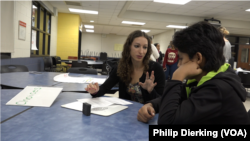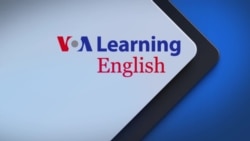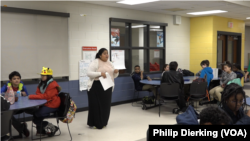In Washington, DC, only 69 percent of public school students graduate from high school on time. Many factors influence that low rate. One of the most important ones is whether the people around the students expect them to succeed.
So, for the past 40 years, a DC organization has stepped in to give around 10,000 students the support and positive environment they need to thrive. This organization, called Higher Achievement, provides students a welcoming space, help with classwork, and caring mentors. More than 95 percent of students who complete Higher Achievement graduate from high school on time.
Katherine Roboff is the group’s executive director in the DC area. She gives several reasons for the group’s success.
One is timing. Higher Achievement does not work with students who are already in high school. It works with students in middle school. They start Higher Achievement at fifth or sixth grade – in the U.S., that is usually ages 11 or 12.
Roboff says research shows that if students are doing well academically in eighth grade—around age 13—they will have a greater chance of graduating from high school and going to college.
In other words, what happens in middle school has a huge impact. The years between ages 10 and 13 may affect a student’s future more than anything that happens academically in high school.
“We know from the research is that middle school is the last best chance to get on track to college."
Roboff explains that students participate in Higher Achievement after school and during the summer, when public schools take a break of about two months. Higher Achievement students do homework, have community meetings, and work one-on-one with a mentor.
“The purpose of the program is to help them use those after school and summer hours to become better prepared academically and to develop their leadership skills and confidence so that by the time they get into eighth grade they are ready to get into some of the top high schools.”
Three Rs
Roboff calls the focus on the middle school years “right-timing.” She says the other two secrets of Higher Achievement’s success also start with “r”: rigor and relationships.
“Rigor” means Higher Achievement has high expectations of the students in the program.
And “relationships” refer to Higher Achievement’s mentorship program.
The mentors are volunteers who live near Washington, DC. Mentors work with students for about an hour each day on subjects such as math or literature. But Roboff says the connection the mentors have with their scholars may be as important as the subjects they work on together.
“The relationships are such an important part of our model. But It’s especially important when you’re in middle school, when so much is changing… to have mentors and staff and summer teachers who are there not only to help you grow academically but first and foremost to be a support for you and to help make sure you have a safe place to go and someone who will listen to you and talk with you and help you figure out things that are going on…”
Roboff says relationships with mentors “make a very, very big difference in the lives of our scholars.”
Michelle Davis is a mentor for Higher Achievement. She says the mentor program allows students to practice new skills privately with someone they trust. For example, she says, they practice critical thinking. Then, Davis says, students have the confidence to think critically when they go back to class.
Dimelza Gonzales-Flores directs the Higher Achievement center at Columbia Heights Education Campus, an urban DC neighborhood not far from the White House.
She says some of the Higher Achievement students do not always get the attention they need to develop academically. As a result, she says, their mentor can have a major impact on their lives.
“They might not have that one-on-one piece or they might not have that chance to voice their opinions and to grow as individuals. And that’s I think what makes Higher Achievement so special and so important in scholars’ lives.”
A partner to the schools
Roboff says Higher Achievement is a partner to the public schools. She wants to support what is happening in the classroom.
But, she adds, schools could learn something from Higher Achievement. She calls it “culture.”
In other words, Roboff believes Higher Achievement provides an environment where students can do their best. She says part of their formula is a “culture of high expectations for scholars.”
An eighth-grader named Kastenny agrees that Higher Achievement has made a big difference for her. She says participating in the program has improved all of her grades, especially in math. Higher Achievement has also helped her become involved in healthy relationships. Perhaps most importantly, it has given her a positive attitude about academics.
“Through Higher Achievement, I learned that I love being around other people and that I find comfort being surrounded in other people, and I love learning. I have a new passion of learning because of Higher Achievement.”
Higher Achievement is counting on those healthy relationships and that love of learning to carry her to high school graduation and beyond.
I’m Phil Dierking.
This story was written for VOA Learning English by Phil Dierking. Kelly Jean Kelly was the editor.
Do you think mentors are the best way to support students in public schools? We want to hear from you. Write to us in the Comments Section or on our Facebook page.
________________________________________________________________
Words in This Story
academic – adj. of or relating to schools and education
achievement – n. something that has been done or achieved through effort : a result of hard work
nonprofit – n. A nonprofit is an organization that uses whatever money it earns or raises to run the organization and to do the work of the organization.
mentor – n. someone who teaches or gives help and advice to a less experienced and often younger person
piece - n. an amount of something considered separately from the rest
relationship – n. the way in which two or more people, groups, countries, etc., talk to, behave toward, and deal with each other
rigor – n. the difficult and unpleasant conditions or experiences that are associated with something
scholar – n. an intelligent and well-educated person who knows a particular subject very well
thrive – v. to grow or develop successfully









